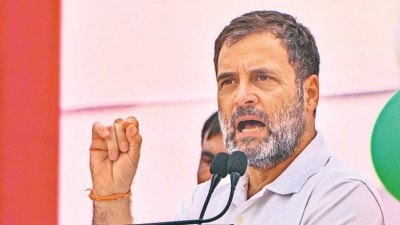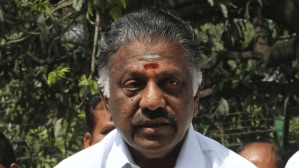No school paired permanently in UP, can reopen closed ones if needed: Education Minister
Says schools located in geographically challenging areas such as those across rivers, highways excluded from pairing process
 The minister's clarification comes in the wake of a backlash from Opposition parties and other sections over the government's initiative of pairing of schools in the state. (File photo)
The minister's clarification comes in the wake of a backlash from Opposition parties and other sections over the government's initiative of pairing of schools in the state. (File photo)Uttar Pradesh Basic Education Minister Sandeep Singh said on Thursday that no school in the state has been merged permanently and that the government can resume classes in the closed ones if the need arises.
Addressing a press conference at the state secretariat in Lucknow, Singh said schools located in geographically challenging areas such as those across rivers, railway crossings or highways have been excluded from the pairing process.
The minister’s clarification comes in the wake of a backlash from Opposition parties and other sections over the government’s initiative of pairing of schools in the state.
He said, “The ongoing school pairing initiative aims to improve education quality without shutting down schools or cutting posts. The complaints from certain districts regarding the initiative have been taken seriously, and necessary action has been taken, including restoring operations in certain schools where required. The children’s access to paired schools has been planned to be simple, convenient and safe.”
Any discrepancies arising from the process are being resolved promptly and that the distance between the paired schools will not exceed one kilometre, Singh claimed.
Efforts are also underway to ensure no school remains vacant by August 15 and that balvatikas and pre-primary classes are operational in all schools by then, he added.
“The pairing initiative is a concrete step toward providing children with a better learning environment and access to educational resources. In schools with very low enrollment, students often miss out on essential experiences such as classroom interaction, peer learning, group activities, games and project-based tasks. Integrating these students into adequately enrolled schools provides them with a complete educational atmosphere,” the minister said.
“Through pairing, the presence of a teacher in every class will be ensured. This will improve the student-teacher ratio and give teachers the opportunity to apply modern teaching methods. As a result, teaching quality will be enhanced, and children will gain confidence and actively participate in learning.”
The schools with higher enrollment, he said, will be given priority for facilities such as smart classes, ICT labs, additional classrooms, composite grants, teaching-learning material (TLM), and sports equipment.
“These resources will enrich students’ academic experiences with technology and infrastructure. The vacant school buildings will also be put to creative use, with plans to operate balvatikas and anganwadi centres in them. This will be a meaningful step towards strengthening pre-primary education and preparing children mentally for Grade 1. Health and nutrition-related activities will be carried out in coordination with other departments,” Singh said.
“The roles of teachers and cooks will remain unaffected and no posts are being done away with. The scheme mandates that schools with up to 50 enrolled students must have three appointed teachers. Schools with more than 50 students will be staffed according to set standards,” he further said.
The minister said to ensure safety and maintain educational quality, a safety audit is being conducted for all school buildings and that dilapidated buildings are being identified and demolished as necessary. “Schools are also being equipped with child-friendly furniture, sports materials, learning corners, wall decorations, wonder boxes and other teaching aids,” he said.
The minister criticised the previous governments, saying they pushed the education system into a critical state. But the current government, he claimed, has appointed over 1.26 lakh teachers and 96% of government schools have been upgraded with basic facilities under Operation Kayakalp.
These improvements have also been recognised by NITI Aayog as a model worth emulating, he remarked, adding the government has distributed 2.6 lakh tablets to basic education teachers, set up over 31,000 smart classes, and established ICT labs in more than 14,000 schools.












